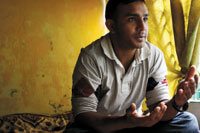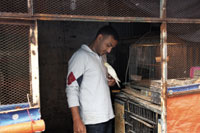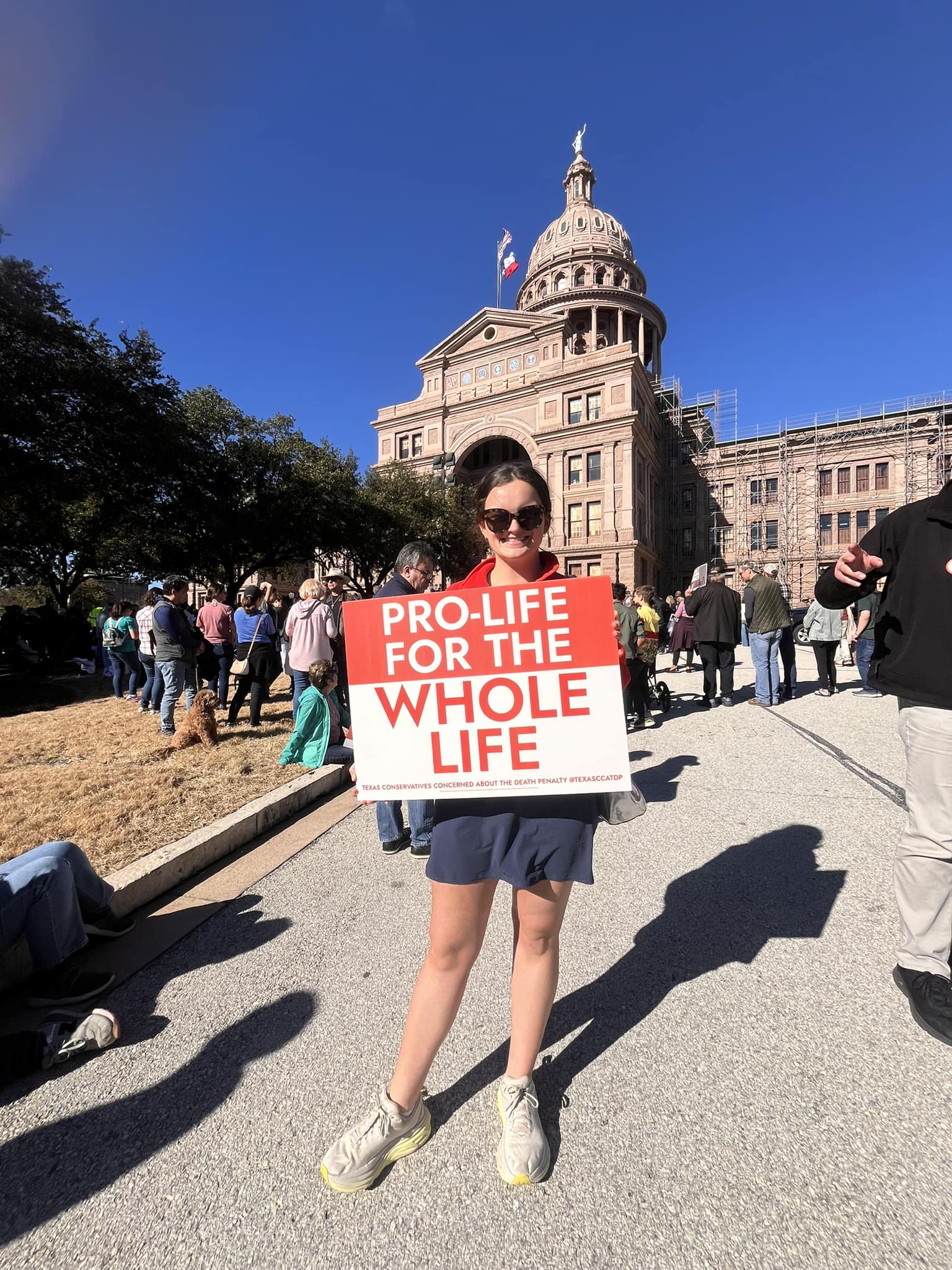Man Without A Country
How immigration reform--and a Texan from Bangladesh--got caught in the deportation dragnet.
On the night in October 2006 that Shahed Hossain left his family’s house in Haltom City, near Fort Worth, for a long drive to Laredo, his mother, Habiba, cooked dinner—chicken and rice and okra picked from the garden. She piled her son’s plate high and watched him eat. Then she took his Bangladeshi passport from a drawer and handed it to him, leaving his green card safely stored away. The 21-year-old had a penchant for losing things, and a green card is not a thing to lose. She hurried him out the door and into the white utility van in the driveway, where his boss waited.
“I’ll see him in a week,” she thought. Like every other time he’d set off for work trips all over Texas, she figured, her younger son would return to the house where he grew up with his brother and his parents and the dog.
That night was the last time Shahed Hossain’s mother would see him free in United States. Six days later, Hossain was locked up in a privately run immigration detention center near the U.S.-Mexico border. He spent more than a year there before he was shackled, loaded onto a plane and flown to Dhaka, Bangladesh.
Hossain is Texan through and through. He walks with a swagger and speaks with a hint of drawl. He and his best friend passed middle-school evenings scurrying down to the creek to catch turtles. On high-school weekends, when they weren’t working at the ice-cream drive-in, they’d escape the suburban lull to go gar fishing. He played freshman-year football and dated a young woman whose mother is an accountant at a major defense contractor. “Everything that I know and everything that I learned, I learned from Texas,” he says. “I love Texas.”
Texas is far away now. Hossain lives with his grandmother, passing solitary days raising carrier pigeons, growing an orchid garden and searching for work, mostly in vain. “I wanna be back home. This is my, what they say, motherland,” he says, leaning forward and laughing in a wooden chair near his small garden alcove. “Back to the motherland! But this is not my home. My home is over there. My home is in Goodnight Circle.” He looks down at his feet and pauses. “That was my street name.”
Had Hossain carried his green card that day, he would now be a citizen like the rest of his family. Instead, a confused run-in with a border guard landed him with a charge that leads directly to deportation—one of a batch of federal laws in recent years that have built a massive deportation dragnet. Hossain was among 319,000 people deported in fiscal year 2007; in the last year, more than 390,000 were deported, matching the record number of expulsions the government administered in President Barack Obama’s first year.
When Obama entered the White House, he promised to push a “comprehensive immigration reform” bill in his first year. Doing so, he apparently calculated, would require a compromise. To garner bipartisan support for opening new paths to citizenship for the 11 million unauthorized immigrants in the U.S., the president, congressional Democrats and key Beltway advocates came together around a strategy: They would endorse a hawkish buildup of deportation and border security in hopes of creating space for broader reforms. In a major speech on immigration last July, the president outlined his approach, vowing to “improve our enforcement policy without having to wait for a new law.”
Almost two years into the Obama presidency, however, no bipartisan support for a broader bill has emerged from this hawkishness. In fact, the few Republicans who once backed immigration reform have fled. Worse, the Democrats’ would-be political trading game conceals a larger, more troubling fact: Even if the strategy eventually works, the “comprehensive” scheme Obama supports will undermine itself with its deportation dragnet. None of the leading immigration-reform proposals coming from Washington Democrats would have prevented Hossain, or others like him, from being deported.
Early on a Saturday afternoon in October 2006, Shahed Hossain had just finished a hard week of remodeling kitchens in Laredo. Before heading back north, Hossain and his boss, Pablo Orozco, and co-worker Daniel Kilos decided to make a quick trip over to the other side. In his 11 years in Texas, Hossain had never been to Mexico. Plus, Orozco had a box of empty Mexican Corona bottles to exchange for a full crate. So Orozco got his beer, and they drove back to the border.
At about 2:15 that afternoon, after waiting in a short line of cars, Orozco rolled down the driver’s-side window and pulled his American passport and Hossain’s Bangladeshi passport and Texas driver license from the glove compartment. The border guard peered into the van, first at Orozco and Kilos in the passenger seat, and then into the back seat at Hossain. He handed Orozco his passport back, and Kilos, a citizen, explained that he’d left his at home in Fort Worth. The officer held up the Bangladeshi passport and asked to whom it belonged. Orozco gestured over his shoulder to Hossain.
Hossain and Kilos were directed into an office next to the crossing, and Orozco was told to wait in the car. Inside, the two young men were led into a small room by a border guard whose chest badge read Gambaro Valvidias. After patting them down, Valvidias asked the two young men if they were citizens. Yes, they said. Valvidias asked Hossain how he’d become a citizen and, according to Valvidias’ account, Hossain said he did not know because his father had done all the paperwork. In the process Hossain realized he’d misspoken and corrected himself.
“No, hold up, no, I’m not a citizen, I’m a resident, sir,” Hossain remembers saying.

(Shahed Hossain at his grandmother’s house in Dhaka, Bangladesh. photo by Erin Hollaway)
Hossain had lived in the country for more than half his life, with his documented immigration status tied to his father, a mechanical engineer who left Bangladesh for fear of political violence and gained political asylum in 1993. Three years later, Shahed and his older brother Sheehab landed in New York City with their mother. The family settled near Fort Worth, and that was that.
Valvidias checked Kilos’ Social Security number through an immigration database and then the FBI’s crime database, and sent him to wait in the van with Orozco. When he ran Hossain through the system, it confirmed he was a lawful permanent resident.
After an hour and a half of waiting in the back room, Valvidias’ shift ended, and he left. When the door opened again a few minutes later, a bald-headed man named Officer Garza sat down across the table.
“You know, you’re very smart,” Hossain remembers Garza saying. “You tried to say something just so you can get past the border.” Looking at Garza, Hossain repeated that he’d made a mistake when he’d said he was a citizen. The border guard was already filling out a form. In Garza’s account, Hossain had connived to fool his way into the country.
Outside, Kilos and Orozco waited for two hours until another uniformed officer walked up to the car. “She told me that Shahed said something really bad to the United States that was a federal offense,” remembers Orozco. “She said he lied that he was a U.S. citizen, and he wasn’t. And that was it.”
Hossain was bused six miles across the city to the Laredo Processing Center, an immigration detention facility run by Corrections Corp. of America (CCA), the country’s largest for-profit prison company.
In the Hossains’ living room, on a shelf near a commemorative plate of President Obama, sits an unframed photograph of Shahed and his older brother standing on the deck of the Staten Island Ferry. It was taken just days after they arrived in the United States. The boys are wrapped in winter coats and scarves. Behind them, on the horizon, is the Statue of Liberty.
For the boys’ father, Quazi Hossain, the loss of his son is an incomprehensible injustice, impossible to reconcile with the vision he’d had for his family when he was granted asylum. In the evenings now, when it’s quiet at the Destiny gas station where he works as an attendant seven days a week for $8 an hour, he slips into tears.
“It’s really tough to make people understand that a kid, when they grow up here—it’s really tough for him to understand what is the difference between citizen and the resident,” says Quazi, who’d been known as a stern dad. He lets out a quiet moan, his eyes turn wet, and he drifts off.
(picture at right: seated from L to R, Shahed’s father, Quazi, his brother, Sheehab, his girlfriend, Erika Fierst, and Erika’s mother. photo by Brian Palmer )

A decade-and-a-half ago, the same year Shahed and his brother and mother came to the United States, Congress created a new category of immigration violation that made it a crime for immigrants of any status to claim to be citizens. The law was intended to prevent undocumented immigrants from lying to get a job or enter the country without a visa. It wasn’t supposed to target green-card holders like Hossain, but as with all of the beefed-up enforcement initiatives federal officials have launched since then, the law is a blunt tool. So Hossain was charged with making a false claim of U.S. citizenship. The charge triggers automatic deportation.
The false-claim provision was a small part of a seismic shift in immigration enforcement that started with the passage of the Immigration Reform and Individual Responsibility Act of 1996. That bill and the shift it initiated were advanced by an ascendant Republican Congress and accepted by a Clinton White House committed to political triangulation. It generated a lasting, if troubling, political consensus about immigration among Washington’s liberal reformers.
With the 1996 law, “Republicans went for all of it,” says Frank Sharry, who has been at the center of every major immigration fight in D.C. since 1996 and now runs America’s Voice, a major supporter of immigration reform in the Beltway debate. “We fought back some of it, but they got their massive buildup of enforcement, evisceration of due process, cutting benefits even for legal immigrants.”
An ironclad immigration enforcement infrastructure had been established. With that in place, Sharry and other Beltway advocates embraced a different Democratic approach: Accept the draconian enforcement measures as water under the bridge, but insist they be tied to, or at least followed by, a pathway to citizenship for undocumented immigrants.
Fourteen years later, no path to citizenship has emerged as deportation rates continue to rise.
The night Shahed Hossain was booked into the detention center, he called his brother’s cell phone.
“When he told me, I laughed,” remembers Sheehab Hossain. “You’re in jail?’ I said, ‘They think you’re illegal.’ And I then remember his voice. He said, ‘No, I’m serious, I’m going to be deported.’”
It was six months after Hossain was thrown into a cell before he appeared in a San Antonio courtroom. The hearing began with the government’s first witness, Officer Valvidias, who explained that Hossain had called himself a U.S. citizen and then retracted the statement, consistent with Hossain’s own account.
Then Officer Garza took the stand and repeated the more ominous narrative he’d filed in his report. In this account, Hossain repeatedly claimed to be a citizen and didn’t retract the statement until officers confronted him with a lie.
When arguments closed, the judge did not stop to deliberate or even leave the chambers. “[H]e claimed he was a United States citizen,” the judge ruled. “I don’t think it’s a matter of he thought he was a U.S. citizen, but he really wasn’t. He went to Mexico without his green card, and he needed a way to get back, and that was the way to get back. It doesn’t make any sense otherwise, so I’m going to have to sustain this charge.”
He ordered Hossain deported pending an appeal, and Hossain went back to detention—where thousands of others await their fates.

(Shahed Hossain at his grandmother’s house in Dhaka, Bangladesh. photo by Erin Hollaway)
The staggeringly high numbers of deporations are a product of the Obama administration’s expansion of many of George W. Bush’s most controversial enforcement policies. In 2002, then-Attorney General John Ashcroft issued a memo radically shifting the balance of immigration enforcement by granting states “inherent authority” to enforce federal immigration law. Building on the new immigration laws enacted in 1996, the memo began a devolution of immigration enforcement to localities by deputizing local cops as immigration agents through what’s called the 287(g) program. Suddenly a simple traffic stop could land a noncitizen in detention. In Bush’s last year in office, the number of deportations rose to 359,000.
The Obama administration has continued driving that number upward. It expanded the 287(g) program to new jurisdictions and is continuing a rapid expansion of a program called Secure Communities, which checks the immigration status of people booked into local jails. Immigration and Customs Enforcement says that the program “focuses immigration enforcement on the most dangerous criminal aliens first.” Data obtained through the Freedom of Information Act by the Center for Constitutional Rights, National Day Laborers Organizing Network and the Benjamin N. Cordozo School of Law show that almost 80 percent of the people deported as a result of Secure Communities have no criminal convictions, or were booked for low-level offenses like traffic violations or petty juvenile mischief. These are ICE’s “criminal aliens.”
Secure Communities is one of an arsenal of programs running up the deportation numbers. A five-year-old border-region program called Operation Streamline is another example. As National Public Radio recently reported, Streamline shuffles groups of several dozen detainees before immigration judges, who issue mass criminal sentencings. There exists nothing else like it in the American judicial system. There are no individual hearings and no real opportunities for appeal. In unison, groups of detainees take guilty pleas and are pegged with criminal records.
It’s all tied to that concerted political strategy to garner support for comprehensive immigration reform. In 2006 and 2007, the year Hossain was deported, the late Sen. Ted Kennedy crafted an immigration reform bill that would have opened a pathway for many undocumented immigrants to gain lawful status. To gain support, the legalization provisions were coupled with harsh enforcement provisions. The bill was crafted and recrafted, growing heavier on enforcement as it moved ahead. In the end, it still failed.
The Obama administration is nonetheless staying the course, refusing to take administrative action to slow deportations or to pick a fight over a broader reform bill.
“I think the criticism ove
the past few years is not only understandable; it is pr
bably right,” acknowledges Frank Sharry, referring to the flak many outside-the-Beltway immigration advocates have sent Washington’s way. “We were so hopeful that legislation was around the corner that enforcement reform didn’t seem like a priority, and talking about it too much undercut legislative results. We have not done enough and should do more on enforcement reform.”
On Aug. 31, 2007, Shahed Hossain finally got his appeal hearing before the Board of Immigration Appeals. It didn’t last long. He left the courtroom and saw his family waiting on benches. “I just looked at my dad, and he seen my face, and my girlfriend was over there, and she started crying. It was like I died,” Hossain recalls.
Ten weeks later, 397 days after he was detained, Hossain was pulled from his cell, and his ankles were shackled. CCA guards led him onto a bus, and he was driven nine hours to the Dallas-Fort Worth airport. Twenty minutes away, his family went about their day as best they could.
The Hossains are still talking to lawyers to find a way to bring back their son. Rachel Rosenbloom, a law professor at Northeastern University, says most deportees’ hopes of returning are nil. “Once someone has been ordered removed and is outside of the country, they have a very tough set of hoops to jump through to get back,” she says.
In Washington, meanwhile, new strategies are emerging. Senate Majority Leader Harry Reid, under mounting pressure from a coordinated movement of students, is pushing the DREAM Act, which would open a path to citizenship to approximately 825,000 undocumented immigrants who graduate from college or serve in the military. The bill failed to pass this fall, but, as he ran for re-election, Reid vowed to reintroduce the bill before newly elected Republicans take control of the House in January.
National and local groups across the country are increasingly focused on rolling back the excesses of the enforcement regime. “If we are going to be continuing to escalate what we call enforcement, or mass deportation,” says Michelle Fei, director of the Immigrant Defense Project in New York City, “many … who are coming forward to register or to get legalized might actually land in deportation. Enforcement will undercut the promise of reform.”
Beltway groups like Frank Sharry’s are tentatively saying they agree. “Frankly,” says Sharry, “most of America’s Voice’s work in the future may be to join with advocates to say this enforcement is wrongheaded. We may need to adjust strategy to the state and local level.”
With the House soon to be in GOP hands and a diminished Democratic hold on the Senate, prospects for immigration reform have all but disappeared in the short term. Hopes for slowing deportations will now focus increasingly on Obama. Unless the president uses his administrative authority to halt or slow mass removals, there will be many more Shahed Hossains.
Quazi Hossain, hunched over in a black leather chair in his living room, remembers the last day he saw his son. “In San Antonio, in the court, that was the last time I saw him face to face,” he says. “I don’t know when I can see him again, ever. If ever I can see him again.”
In Dhaka, Shahed Hossain, walks into a small room where he keeps a pigeon coop he built to pass time. He pulls open the latch, and the birds stream out, their wings flapping furiously. He latches the cage and steps outside, his eyes darting from bird to bird above him as if deciding which one to follow.
“They’ll be back,” he says.
Seth Freed Wessler is a senior research associate at the Applied Research Center in New York City and a contributor to ColorLines.com, an online magazine that produced this story. Brian Palmer contributed reporting from Bangladesh, which was supported by the Investigative Fund at The Nation Institute.


